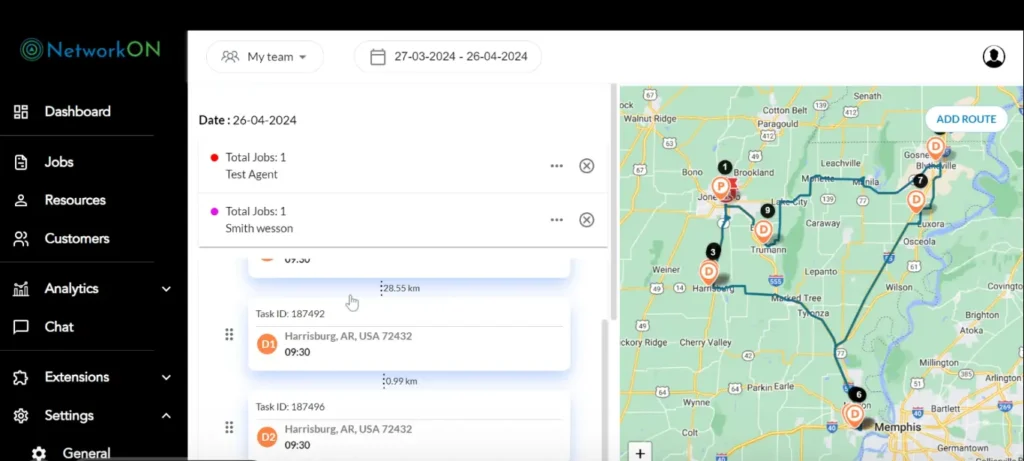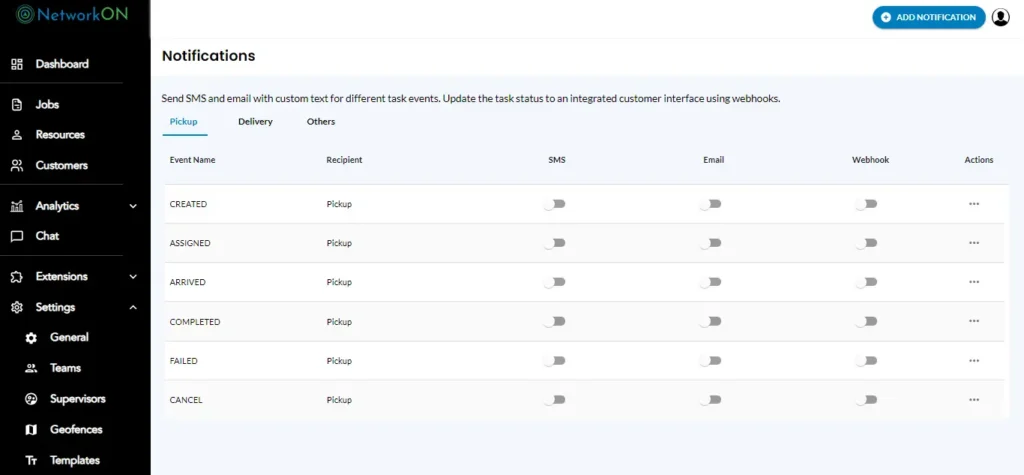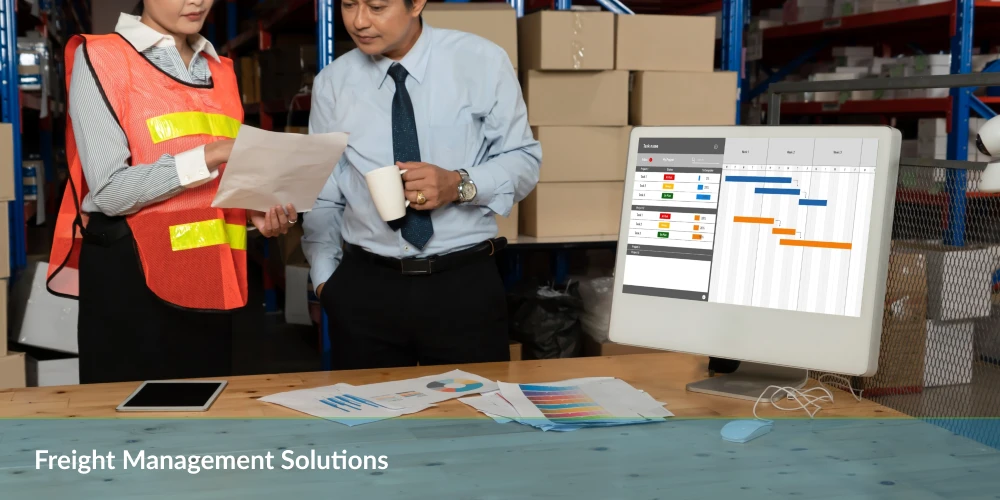Table of Contents
Welcome to a comprehensive overview of freight management solutions, a cornerstone for businesses striving for optimal logistics and supply chain efficiency. These systems are pivotal in stream options and often dramatically increase profitability through improved transportation methods, meticulous carrier management, and enhanced customer service. With these elements harmoniously integrated, organizations can expect a tangible upturn in operational productivity.

Deep dive into how transportation strategies can be fine-tuned through advanced analytics provided by freight management systems, unleashing potential for cost reduction and service agility. Discover the art and science of carrier management that rides on selecting the right partners, utilizing benchmarking, and negotiating rates backed by accurate data. Furthermore, a spotlight is placed on customer service, where transparency and real-time updates become key drivers for customer satisfaction in the logistics domain.
Understanding these key elements enables companies to leverage freight management solutions to forge ahead in today’s complex marketplace, ensuring they keep pace and set market standards.
Advancements in Supply Chain Optimization
freight management solutions have witnessed a transformative leap by integrating advanced supply chain optimization strategies. A marked shift has seen the utilization of sophisticated algorithms and cutting-edge technologies, carving a path for unprecedented efficiency in the logistics sector.
Role in Freight Management
Modern supply chain optimization is now at the forefront of freight management. Through meticulously analyzing logistics processes, systems are designed to reduce waste, maximize resources, and synchronize operations to precisely meet demand.
Leveraging Data Analytics and Predictive Modeling
Data analytics has redefined how freight managers predict and react to market demands. By harnessing large datasets, predictive modeling facilitates proactive decision-making, enabling companies to anticipate fluctuations and align their strategies accordingly. Utilizing machine learning algorithms, businesses gain actionable insights from historical and real-time data, thus optimizing their freight operations to meet sophisticated performance benchmarks.
- Data-driven strategies ensure that cargo space is utilized optimally.
- Predictive analytics can forecast transit times with greater accuracy, minimizing delays.
- Increased visibility into supply chain risks empowers businesses to mitigate potential disruptions before they escalate.
Fleet Management and Telematics
Fleet management encompasses the administrative approach to maintaining, controlling, and tracking freight vehicles. Telematics combines telecommunications and informatics to provide insights into fleet operations.
Tracking Shipments in Real-Time
In today’s logistics environment, real-time visibility of shipments is not negotiable. Companies rely on GPS technology and advanced software to track freight vehicles, ensuring timely delivery and up-to-the-minute statuses of shipments.
Ensuring Safety and Compliance Standards
Compliance with safety regulations protects companies from legal issues and guarantees the welfare of drivers and the public. Telematics assists in monitoring vehicle status and driver behavior and ensures adherence to compliance standards by instantly capturing and analyzing relevant data points.
- Fleet managers receive alerts for maintenance needs, preventing breakdowns and extending vehicle life.
- Integrated systems log driver hours to uphold labor laws and prevent fatigue-related incidents.
- Data collected through telematics supports audit trails for compliance and can be critical evidence in liability disputes.
Operators gain unparalleled control over logistics operations by integrating fleet management and telematics. They streamline processes, achieve higher safety standards, and reduce risks associated with non-compliance and vehicle operation. Through this synergy, transportation companies deliver results that resonate with efficiency, safety, and regulatory conformity.
Route Planning and Optimization for Reliable Deliveries

Effective route planning and optimization stand at the forefront of streamlining freight movement. Companies ensure timely deliveries by meticulously designing travel paths while achieving cost efficiency. Advanced routing algorithms dictate the most efficient path among multiple stops, considering variables such as different traffic patterns, weather conditions, and vehicle capacity constraints.
- Minimizing Delays and Reducing Costs: Strategic routing directly minimizes unforeseen delays. Drivers navigate with confidence, knowing they are taking the most efficient routes. This optimization translates to fuel savings, reduced overtime costs, and lower vehicle wear-and-tear, ensuring that the savings trickle down through various facets of the operation.
- Implications for Multi-Modal Transportation Solutions: As the intricacy of shipments increases, particularly with multi-modal transport requirements, the precision of route planning becomes more pronounced. Integrating various modes of transportation—air, sea, rail, and road- requires a carefully orchestrated plan that considers schedules and transfer points to guarantee seamless transition and delivery.
Adapting to multi-modal transportation offers flexibility for shifting between shipment methods in response to cost, timing, or route efficacy. Decision-makers can rely on optimization tools to determine the fastest, most economical, or most environmentally sustainable routes, accommodating a wide array of shipping needs and preferences. The added complexity of these transportation chains necessitates a robust system to execute decisions that consider time windows, carrier schedules, and cross-docking operations, all pivotal for maintaining a reliable and high-performing delivery network.
Streamlining Inventory Management: A Strategic Imperative
Companies seeking optimization in their supply chain understand that balancing supply and demand aligns closely with profitability. By meticulously coordinating inventory levels with anticipated demand, businesses can reduce excess stock, minimize storage costs, and prevent stockouts. This precision necessitates robust freight management solutions that provide comprehensive visibility and control over shipments.
Visibility in inventory management involves real-time tracking of goods across multiple touchpoints in the supply chain. When companies have access to information about the movement of their products, decision-making becomes data-driven, thereby increasing the accuracy of their inventory forecasting. Control is exerted when managers can intervene proactively to reroute shipments, adjust purchase orders, and optimize inventory distribution in response to changes in demand or supply conditions.
- Using advanced telemetry devices, companies can monitor the conditions and security of their products during transit, leading to informed inventory staging strategies.
- Integrated systems allow for automated updates to inventory records when shipments are received, enhancing accuracy and reducing the need for manual input.
- Data analytics applied to inventory trends help businesses anticipate demand surges or declines, ensuring appropriate stock levels are maintained.
Companies that master inventory management optimize their internal operations and position themselves as reliable partners in the eyes of suppliers and customers, who depend on consistent product availability. When effectively implemented, freight management solutions translate into a smooth, responsive supply chain that can adapt to market dynamics and maintain service excellence.
The Necessity of Freight Auditing and Payment Services
Freight auditing and payment services streamline the complex process of transportation billing, ensuring accuracy and enabling cost reduction. By meticulously examining freight bills, companies identify billing errors, uncover inefficiencies, and unlock savings opportunities. Unlike simple invoice reviews, a thorough audit delves deep into contractual agreements, matching performed services against billed charges.
Accuracy in Billing and Cost Reduction Strategies
Firms leverage freight auditing to dissect shipment data and align it with agreed-upon rates and service guides. This careful validation process often reveals overcharges, duplicate payments, and accessorial fees that may not align with the service level provided. Addressing these discrepancies promptly inevitably leads to direct financial recovery. Moreover, data collected during the audit informs negotiation strategies, helping companies achieve more favorable shipping terms.
Implementing freight auditing and payment services presents a clear path to financial integrity and competitive edge. While the upfront investment in such systems or services may be significant, the return regarding both cost savings and customer satisfaction firmly justifies the outlay.
Transportation Management Systems (TMS) as a Core Solution
Transportation Management Systems (TMS) form the backbone of modern freight management, efficiently streamlining the movement of goods from origin to destination. These sophisticated platforms offer various features, such as route planning, carrier selection, and load optimization, contributing substantially to cost savings and service improvement.
Features and Advantages
A robust TMS provides actionable insights into shipping data, enabling businesses to make informed decisions. Real-time freight tracking and analytics features improve delivery predictability and customer satisfaction. Additionally, centralized control over transport activities affords businesses the agility to respond to dynamic market conditions.
Integration with Other Technologies (AI, IoT, Blockchain)
A TMS becomes even more powerful by integrating artificial intelligence, the Internet of Things (IoT), and blockchain. AI algorithms can predict and mitigate disruptions, IoT devices monitor environmental conditions during transport, and blockchain introduces a new level of security and transparency in the supply chain.
- Artificial Intelligence: For processing vast datasets to unveil optimization opportunities.
- Internet of Things: Sensors and devices gather granular data throughout a cargo voyage.
- Blockchain: Creates immutable records of transactions, instilling trust among stakeholders.
Mastering the Art of Carrier Selection and Relationship Management
Selecting the right carriers directly influences the success of freight operations. Companies must assess numerous factors: cost-effectiveness, service reliability, coverage areas, and carrier performance history. This strategic approach ensures the delivery of goods on time, maintains customer satisfaction, and optimizes operational costs.
Criteria for Selection
Determining the most suitable carrier involves a comprehensive analysis. Shippers evaluate transit times, shipping rates, and the types of goods carriers are equipped to handle. Additionally, they consider carriers’ financial stability and safety records, indicators of a carrier’s reliability and professionalism.
- Transit times impact how quickly goods reach their destinations, reflecting customer satisfaction.
- Shipping rates are scrutinized to align with budget constraints without compromising service quality.
- The nature of goods, whether perishable, fragile, or hazardous, requires carriers with specialized equipment and expertise.
- The financial stability of carriers protects against potential service disruptions.
- Safety records are integral to ensure compliance with regulatory requirements and to minimize the risk of accidents.
Enhancing Long-Term Strategic Partnerships
Establishing and nurturing strategic partnerships with carriers goes beyond transactional interactions. These relationships are founded on mutual trust, transparency, and regular communication. Shippers and carriers work towards common goals by sharing forecasts, volume commitments, and strategic objectives.
Successful collaborations lead to preferential pricing, improved service levels, and access to additional capacity during peak periods. Carriers become proactive partners, proposing innovative solutions and adjustments to changing market conditions. Hence, these partnerships enhance the overall efficiency and resilience of the shipping process.
Encouraging carrier loyalty through consistent and fair dealings results in preferential treatment during contract negotiations and service execution. Recognition programs for carriers that exceed performance expectations incentivize continuous improvement and bolster the partnership further.
Compliance and Safety Standards in Freight Management
Freight management resides at the crossroads of a dynamic regulatory environment and the perpetual quest for operational safety. As new regulations emerge, compliance becomes a fluid and ongoing component of logistics strategy. Those managing freight must continuously adapt to legislation changes, ensuring all practices align with current standards.
Risk management in freight extends beyond mere compliance; it Encapsulates a comprehensive approach to insurance solutions. Those in the field must assess potential perils and secure appropriate coverage. This proactive stance minimizes financial exposure and protects against unforeseen events. Insurance is a safety net and a strategic asset within the freight management framework.
- Legislation such as the ELD mandate in the United States, which requires electronic logging device installation, exemplifies regulatory changes directly impacting freight operations.
- Similarly, compliance with the International Maritime Organization’s (IMO) sulfur cap requires adjustments to fuel types used by shipping vessels.
Mastery of compliance details ensures legal and responsible freight operations. This diligence reflects a commitment to safety, the environment, and ethical practices. Adherence to compliance and safety standards in freight management underscores a brand’s reputation and reliability in the eyes of partners and customers.
Real-Time Cargo Sparse Style: Redefining the Shipment Lifecycle
Modern logistics insists on shedding the limitations of historical shipment tracking. Today’s customers demand precise information on their cargo’s whereabouts. The standard has shifted; mere estimations no longer suffice. Real-time cargo tracking and visibility systems have surfaced as a necessity in addressing this need, delivering actionable insights and full transparency across a consignment’s journey.
Expectations of Modern Customers
In the digital age, immediacy feeds customer satisfaction. Clients require updates at their fingertips—whether to adjust their operations in response to delays or simply for peace of mind.

State-of-the-art freight management integrates systems enabling customers to monitor shipments in real time, granting a sense of control and assurance.
Enhancing the Reliability of Transportation Services
Accuracy in tracking equates to reliability in service. Operators wielding real-time visibility assure timely interventions when disruptions occur. The connectivity across supply chains facilitates proactive measures, ensuring that efficiencies are realized and delivery promises are kept. Advanced tracking technologies foster a harmonious flow of goods, enhancing the robustness of transportation services.
- Operators gain an eagle-eyed view of fleets, ensuring expedient management of unexpected events.
- Customers enjoy a transparent journey of their goods, empowering them to plan and execute precisely.
- Real-time data bolsters decision-making, refining operational agility and capacity forecasting.
Real-time cargo tracking augments the fundamental aspects of freight management solutions. Operators leverage these tools confidently to underpin their service pledges.
Cutting Costs with Intelligent Freight Management
Companies striving for financial agility turn to intelligent freight management. Leveraging advanced strategies for controlling spending can lead to significant savings.
Identifying Cost Reduction Strategies
A comprehensive analysis of transportation spending highlights areas for cost savings. By examining shipment patterns, businesses can consolidate shipments to maximize space and reduce expenses. Evaluating supplier contracts ensures that terms optimize cost efficiency. Additionally, considering alternative modes of transportation may uncover cheaper or more efficient shipping routes.
Freight Auditing and Performance Metrics
Freight auditing uncovers billing inaccuracies and opportunities to reclaim overpayments. It meticulously reviews shipping invoices against contracted rates and service agreements. Performance metrics, meanwhile, provide insight into service provider efficiency, enabling data-driven decisions for carrier optimization. Businesses employing these tactics often realize substantial financial advantages.
- Regular auditing can reveal recurring issues and help negotiate better carrier rates.
- Performance metrics gauge timely deliveries, damage rates, and cost per shipment, informing future decision-making.
- Optimal decisions based on real-time metrics reduce costs without compromising service quality.
By integrating intelligent freight management solutions, organizations can streamline their operations. These systems afford sharper insights into logistics, fostering a more economical and robust supply chain.
Driving Sustainability in Freight Operations
Green logistics are transforming the way companies conduct freight operations. Implementing sustainable practices reduces environmental impact and can often result in cost savings. This intersection between ecology and economy encourages businesses to commit to more responsible methods of moving goods.
Importance of Green Logistics
Beyond the obvious environmental benefits, green logistics offer a competitive edge. They align with increasing regulatory demands and consumer expectations for eco-friendly operations. These benefits ripple across the entire supply chain, promoting longevity and resilience in business models.
Implementing Sustainable Practices
Sustainable practices in freight operations require strategic planning and investment. Electrifying fleets, optimizing routes for fuel efficiency, and utilizing intermodal transportation minimize carbon footprints. Additionally, embracing automation and data analytics improves operational efficiency and sustainability by providing insights into energy consumption patterns.
- The adoption of electric vehicles (EVs) in fleets directly reduces greenhouse gas emissions.
- Route optimization saves fuel and ensures timely deliveries with reduced environmental impact.
- Intermodal transportation, combining different modes of transport, makes the best use of each mode’s efficiency.
As a result, these practices contribute to a more sustainable and environmentally responsible freight industry. Companies leading in sustainability often benefit from enhanced brand reputation and loyalty, fostering a stronger connection with environmentally conscious consumers.
Custom Clearance and Documentation Made Easy
Transforming the international shipping landscape, freight management solutions now streamline the complex customs clearance and documentation processes. This evolution touches directly upon efficiency, with a major reduction in the time-consuming challenges shippers once faced.
Simplifying International Shipping
Navigating through the maze of international shipping regulations requires expertise, which modern freight management platforms readily provide. These systems come equipped with up-to-date knowledge on tariffs, taxes, and trade agreements, effectively equipping businesses to handle cross-border transactions seamlessly.
Technology Integration to Ease Processes
With the advancement of technology, the digitization of custom processes and documentation has undergone a revolutionary shift. Integrating electronic data interchange (EDI) and blockchain ensures secure and swift transmission of shipping documents, drastically reducing the possibility of human error and enhancing the velocity at each stage of the clearance process.
These integrated systems accelerate supply chain flow, which improves customer satisfaction and increases competitiveness in the global market. The subsequent reduction in clearance times also lowers demurrage and detention costs.
- The intricate procedures of customs clearance, once a hurdle, now benefit from automated notifications and status updates.
- Document management technologies assist in generating, collecting, and storing necessary documentation.
- Artificial Intelligence (AI) and machine learning algorithms predict and rectify potential compliance issues before they can disrupt the supply chain.
Benchmarking and Performance Metrics in Freight Management
Effective freight management hinges on the ability to measure and analyze performance. Successful logistics companies leverage benchmarking and performance metrics as a compass for decision-making and operational enhancements. Insight derived from metrics like on-time delivery rates, cost per shipment, and freight billing accuracy informs strategic direction. Diving deeper into performance data, companies refine processes for maximum efficiency and cost-effectiveness.
Measuring Success in Freight Management
Achievement in freight management is quantified through a mix of qualitative and quantitative metrics. Companies monitor carrier performance, rate of successful deliveries, and customer satisfaction levels. Consistent tracking of these metrics ensures that logistics services meet and exceed industry standards. The yardstick for success constantly advances, bolstering competitiveness in a dynamic market.
Utilizing Data for Continuous Improvement
Data is the fuel for progress in freight management solutions. Comprehensive analysis of periodic data enables logistics entities to identify trends, anticipate issues, and instigate proactive measures. Continuous improvement programs thrive on such insights, illuminating paths for cost reduction, service enhancement, and risk mitigation. Tailored solutions emerge, matched perfectly to the intricate demands of supply chain management.
Innovative Use of Technology in Freight Solutions
Technological innovation drives the freight industry forward, reshaping how goods are moved globally. Integrating advanced systems and applications makes freight management more efficient and adaptive to evolving market demands. Reflect on how the interplay of artificial intelligence (AI), the Internet of Things (IoT), and blockchain technology streamlines operations and establishes new benchmarks for security, transparency, and reliability in logistics.
AI, IoT, and Blockchain Applications
AI transforms data into actionable insights, optimizing routes, predicting maintenance, and facilitating intelligent decision-making. IoT devices monitor shipments, providing real-time data that enhances cargo visibility and control throughout the supply chain. Blockchain introduces immutable records, promoting accountability and trust among stakeholders while simplifying transactions and reducing fraud. These technologies form a triumvirate that champions efficiency and value in a digitally connected freight environment.
Future Trends in Freight Technology
Emerging trends indicate a trajectory towards even deeper technological integration. Automated vehicles promise reductions in transit times and labor costs. Drones offer the potential for rapid last-mile delivery solutions. Advancements in machine learning will further refine predictive analytics for demand forecasting and inventory management.
Moreover, the adoption of 5G networks is set to revolutionize communication speed and reliability, enabling more complex applications of IoT in freight management. Engage with these advancements as they delineate the roadmap for the future of freight technology.
Reinforcing Customer Service and Communication Tools
Achieving excellence in freight management demands more than efficient transportation; it necessitates strong customer service and robust communication tools. Customers expect transparency during the shipping process, and by providing this, trust is built, which is foundational to long-lasting business relationships. Enhanced communication tools facilitate this transparency and foster an environment where information flows seamlessly between shippers, carriers, and customers.
Tools such as Customer Relationship Management (CRM) systems integrate into the existing freight management infrastructure, allowing for proactive communication. Key updates about their shipments, including delays, estimated time of arrival, and proof of delivery, can be sent automatically to customers. Customers no longer need to contact customer service representatives for this information, as they have immediate access to the data they need.
- Building Consumer Trust through Transparency: Openness in operations allows customers to feel secure. Today’s technology enables customers to view real-time data concerning their shipments, which directly contributes to their peace of mind.
Tools for Enhanced Communication with Customers: Advancements such as chatbots, automated notifications, and dedicated customer portals are game-changers. Customers can interact with chatbots for quick responses to their queries or log into portals to easily view shipment history and make new logistics requests.
Pro Tip: Leverage integrated communication tools in freight management solutions to enhance customer satisfaction and operational efficiency. These tools streamline interactions and provide real-time updates, strengthening your supply chain’s resilience and responsiveness.
Exploring Multi-Modal Transportation Solutions
With the complexities of global trade increasing, businesses require versatile transportation strategies. In this context, multi-modal transportation emerges as a transformative approach. Integrating different modes of transport, from shipping to rail to trucking, offers flexibility in routing, cost efficiency, and adherence to delivery schedules.
Benefits of a Multi-Modal Approach
Businesses that leverage multimodal transportation can potentially reduce costs by optimizing different transport methods. Moreover, multimodal solutions can decrease transit times and increase supply chain reliability. Streamlining the transfer of goods through various transportation nodes also enables better resource utilization and can contribute to environmental sustainability goals through carbon footprint reduction.
Exploring multi-modal transportation solutions thus leads to improved supply chain resilience and a competitive edge in today’s dynamic market. Companies able to implement these solutions stand to reap benefits through enhanced agility and cost-effectiveness in their logistics operations.
E-Commerce Logistics and Last-Mile Delivery Challenges
E-commerce has surged, reshaping logistics and parcel delivery landscapes. Buyers now expect fast, reliable delivery directly to their doorsteps. As the number of online transactions multiplies, logistics companies encounter new layers of complexity in the final leg of the delivery process, known as last-mile delivery. This phase is fraught with challenges: deliveries involve navigating congested urban routes, ensuring customer availability, and maintaining low costs while meeting high-speed delivery promises.
Addressing the Demands of E-commerce Growth
Growth in e-commerce has led to an increased volume of small parcel deliveries, each requiring individual processing, dispatch, and tracking. Escalating expectations for same-day or next-day delivery places intense pressure on logistics networks to perform without hiccups. Successful adaptation hinges on integrating advanced technologies with legacy systems, adopting more flexible delivery schedules, and upscaling warehouse and fulfillment centers closer to customer locations to reduce last-mile delivery times.
Solutions for Efficient Last-Mile Delivery
- Implementing dynamic routing software allows delivery fleets to respond agilely to traffic conditions, minimizing delays and optimizing delivery schedules.
- Investing in delivery management platforms that streamline communication between couriers and customers ensures punctual deliveries through real-time updates and flexible rescheduling options.
- Exploring partnerships with local businesses can serve as potential package pick-up points, offering customers collection flexibility and reducing failed delivery attempts.
- Expanding the fleet to include electric or hybrid vehicles contributes to cost savings in fuel and benefits the environment, aligning with the growing preference for sustainable practices among consumers.
Key Takeaways
1. Enhanced Efficiency Through Technology Integration: Leveraging advanced technologies like AI, IoT, and blockchain in freight management solutions boosts operational efficiency, provides real-time insights, and enhances transparency across the supply chain. These technologies streamline processes, optimize routes, and improve decision-making.
2. Data-Driven Decision Making: Utilizing data analytics and predictive modeling helps businesses make informed decisions, anticipate market fluctuations, and optimize freight operations. This leads to better resource utilization, reduced delays, and significant cost savings.
3. Real-Time Visibility and Tracking: Real-time cargo tracking systems are essential for ensuring timely deliveries and maintaining high customer satisfaction. Enhanced visibility into shipments enables proactive management of disruptions and improves overall reliability.
4. Strategic Carrier Management: Selecting and managing the right carriers is crucial for efficient freight operations. Building strong partnerships with carriers based on reliability, performance, and cost-effectiveness ensures timely deliveries and optimized logistics.
5. Embracing Sustainability: Implementing green logistics practices, such as using electric vehicles and optimizing routes for fuel efficiency, not only reduces environmental impact but also aligns with regulatory requirements and customer preferences for eco-friendly operations.
Wrapping It Up!
Dive deeper into sophisticated freight management; uncover how incorporating comprehensive solutions elevates operational efficiency and transforms supply chain dynamics. Transportation and logistics entities stand to gain significantly from a holistic approach to freight management, ensuring that every supply chain link is optimized, compliant, and cost-effective.
Expeditious route planning ensures timely deliveries, while fleet telematics offers unparalleled visibility, promoting operational transparency. Enhanced inventory management strategies prevent stockouts and decrease carrying costs. Uninterrupted cargo tracking and sophisticated data analytics provide the intelligence to make informed decisions, reduce risks, and capitalize on emerging market trends.
Acknowledging the intricate nature of global trade networks, freight management solutions simplify complex customs clearance processes. Adopting a Transportation Management System (TMS) allows businesses to streamline operations, foster enduring relationships with carriers, and confidently handle compliance. Moreover, employing environmental sustainability measures benefits the planet and aligns with increasingly strict regulations and customer expectations.
Are you ready to harness the full potential of reliable freight management? Review your strategies, engage with technology, and embark on a journey toward seamless, scaled, and sustainable freight operations with NetworkON.
For more information, contact us Today!
Frequently Asked Questions
What are the key benefits of using freight management solutions?
Freight management solutions streamline logistics by enhancing carrier management, optimizing transportation routes, and improving customer service. They provide real-time visibility, reduce operational costs, and increase overall efficiency in the supply chain, leading to higher profitability and better service delivery.
How does data analytics improve freight management?
Data analytics allows businesses to predict and respond to market demands more effectively. By analyzing large datasets, predictive modeling enables proactive decision-making, optimizes freight operations, and forecasts transit times with greater accuracy. This reduces delays, minimizes costs, and enhances overall supply chain performance.
What role does telematics play in fleet management?
Telematics combines telecommunications and informatics to offer real-time insights into fleet operations. It helps monitor vehicle status, track shipments, ensure compliance with safety regulations, and manage maintenance needs. This integration promotes safety, efficiency, and regulatory adherence in fleet management.
How can multi-modal transportation solutions benefit my logistics operations?
Multi-modal transportation solutions integrate various modes of transport (e.g., air, sea, rail, and road) to optimize routing, reduce costs, and increase flexibility. This approach enhances supply chain resilience, improves delivery schedules, and can contribute to environmental sustainability by leveraging the most efficient transportation methods available.





0 Conversations